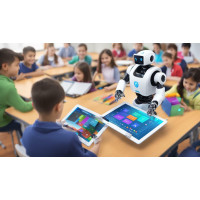How do you use AI Tools in the classroom?

Artificial intelligence (AI) tools have become increasingly prevalent in educational settings, revolutionizing teaching practices and enhancing learning experiences. Educators are exploring the potential of integrating AI technology into their classrooms to create more interactive and personalized learning environments for students.
AI tools in education offer a wide range of benefits. They can improve student engagement by providing interactive learning platforms and virtual assistants that promote active participation and collaboration. These tools also enable personalized learning experiences, adapting instruction to individual student needs and preferences.
The use of AI in educational settings has the potential to enhance student outcomes. AI technology can analyze data to identify areas for improvement, provide targeted feedback, and support individual student progress. By leveraging AI tools, educators can create more effective teaching practices that cater to the diverse learning needs of their students.
However, integrating AI tools in the classroom is not without its challenges. Issues such as data privacy, teacher training, and ethical considerations need to be addressed to ensure the responsible and effective use of AI technology in education.
The future of AI in education looks promising. As advancements continue to be made, educators have the opportunity to shape the future of AI-driven education. Emerging trends and developments are paving the way for innovative teaching methods and improved student outcomes.
Key Takeaways:
- AI tools in education revolutionize teaching practices and enhance learning experiences.
- They improve student engagement and enable personalized learning experiences.
- AI technology can enhance student outcomes by identifying areas for improvement and supporting individual progress.
- Integrating AI tools in the classroom requires addressing challenges such as data privacy and teacher training.
- The future of AI in education holds promising possibilities for innovative teaching methods and improved student outcomes.
Understanding the Benefits of AI Tools in Education
The integration of AI tools in the classroom offers numerous benefits, ranging from increased student engagement to personalized learning experiences tailored to individual needs. AI technology has the potential to transform traditional teaching practices, making education more interactive and adaptive. By harnessing the power of AI, educators can create dynamic learning environments that stimulate students' curiosity and enhance their academic outcomes.
One of the major advantages of AI tools in education is improved student engagement. Interactive learning platforms powered by AI can captivate students' attention and make the learning process more enjoyable. Virtual assistants equipped with AI technology can provide immediate feedback and support, encouraging active participation and collaboration among students. By incorporating AI-driven solutions, educators can create a classroom environment that nurtures critical thinking, creativity, and problem-solving skills.
AI tools also enable personalized learning experiences, addressing the unique needs and learning styles of individual students. By analyzing vast amounts of data, AI algorithms can adapt instruction to each student's pace and level of understanding. This personalized approach fosters student autonomy and self-directed learning, empowering students to take ownership of their education. It also allows educators to identify areas for improvement and provide targeted interventions, ensuring that no student is left behind.
| Benefits of AI Tools in Education |
|---|
| Increased student engagement |
| Personalized learning experiences |
| Adaptive instruction |
| Immediate feedback and support |
| Enhanced critical thinking and problem-solving skills |
Furthermore, the effective use of AI in the classroom equips educators with powerful tools to analyze student performance and progress. AI algorithms can track and analyze data on student achievements, enabling educators to identify strengths and weaknesses. This data-driven approach allows for targeted interventions and individualized support. It also facilitates evidence-based decision-making, helping educators refine their teaching strategies and improve overall instructional effectiveness.
In conclusion, the integration of AI tools in education holds immense potential for transforming the learning experience. From increased student engagement and personalized learning experiences to adaptive instruction and data-driven decision-making, AI technology offers a range of benefits for students and educators alike. By embracing AI in the classroom, we can unlock new possibilities and empower students to thrive in an ever-evolving digital world.
Enhancing Student Outcomes with AI Tools
AI tools play a significant role in supporting student learning by providing personalized feedback, identifying areas for improvement, and ultimately enhancing overall academic outcomes. With the advancements in AI technology, educators now have access to powerful tools that can assist in creating tailored learning experiences for each student.
One of the key benefits of AI tools in education is their ability to provide personalized feedback. Traditional methods of assessment often lack individualized feedback, which can hinder student growth and development. However, AI tools can analyze student responses and provide targeted feedback that is specific to their needs. This not only helps students understand their mistakes but also guides them towards the correct solutions, fostering a deeper understanding of the subject matter.
Furthermore, AI tools are capable of identifying areas for improvement in student performance. By analyzing patterns and trends in student data, these tools can pinpoint areas where students may be struggling and provide additional resources or interventions to support their learning. This targeted approach ensures that students receive the necessary support and resources to overcome their challenges, leading to improved outcomes.
Finally, AI tools have the potential to enhance overall academic outcomes. By personalizing the learning experience and providing targeted feedback, these tools can increase student engagement and motivation. When students feel that their individual needs are being met, they are more likely to be actively engaged in the learning process and take ownership of their education. As a result, academic performance improves, leading to better outcomes for both individual students and the educational system as a whole.
| Benefits of AI Tools in Education |
|---|
| Personalized feedback |
| Identification of areas for improvement |
| Enhancement of overall academic outcomes |
In conclusion, AI tools have the potential to revolutionize education by providing personalized feedback, identifying areas for improvement, and enhancing overall academic outcomes. With their ability to analyze student data and tailor instruction accordingly, these tools empower educators to create engaging and effective learning experiences. As AI technology continues to evolve, it is important for educators to embrace these tools and leverage their potential to improve student outcomes.
Integrating AI Tools in Teaching Practices
Educators can effectively integrate AI tools into their teaching practices to create dynamic and interactive learning environments that captivate students' interests. By incorporating AI technology in the classroom, teachers can enhance the learning experience and provide personalized instruction tailored to each student's unique needs.
One powerful way to integrate AI tools is through interactive learning platforms that leverage machine learning algorithms to adapt content and activities based on individual student progress. This personalized approach helps students stay engaged and motivated, as they receive targeted feedback and guidance that matches their specific learning pace and style.
Furthermore, virtual assistants powered by AI can support educators in managing administrative tasks, grading assignments, and providing immediate responses to student inquiries. These virtual assistants can free up valuable time for teachers, allowing them to focus more on delivering quality instruction and building meaningful connections with their students.
It's important to note that while AI tools offer tremendous potential in education, they should be used as complementary tools rather than replacements for human interaction and guidance. Educators play a vital role in utilizing AI effectively and ethically, ensuring that the technology serves as a facilitator of learning rather than a substitute for the teacher-student relationship.
| Key Benefits of Integrating AI Tools in Teaching Practices |
|---|
| Enhanced student engagement through personalized learning experiences. |
| Time-saving administrative support for educators through virtual assistants. |
| Adaptive learning platforms that cater to individual student needs and progress. |
| Opportunities for creative collaboration and problem-solving. |
In summary, integrating AI tools in teaching practices can revolutionize education by providing teachers with valuable resources and insights to enhance student learning outcomes. It's an exciting time for educators to embrace AI technology and harness its potential to create innovative and engaging educational experiences for their students.
AI Tools for Personalized Learning
Personalized learning has gained traction in the educational landscape, and AI tools offer the capability to tailor instruction to the unique learning styles and needs of each student. By harnessing the power of artificial intelligence, educators can create customized learning experiences that enhance student engagement and promote academic success.
One example of AI tools for personalized learning is adaptive learning platforms. These platforms use algorithms to analyze student data and provide targeted recommendations for content and activities. Through continuous assessment and feedback, AI can identify areas where students may be struggling and adjust the learning materials accordingly. This individualized approach allows students to learn at their own pace, filling knowledge gaps and building a solid foundation for further learning.
Additionally, AI-driven virtual assistants can provide personalized support to students. These assistants can answer questions, provide explanations, and offer guidance on a one-on-one basis. By tailoring responses to each student's specific needs, virtual assistants can foster a deeper understanding of the subject matter and encourage critical thinking skills.
Benefits of AI Tools for Personalized Learning:
- Customized learning experiences tailored to each student's needs
- Enhanced student engagement and motivation
- Individualized feedback and support
- Improved academic outcomes
"AI tools have the potential to revolutionize education by creating personalized learning experiences that meet the unique needs of each student."
| AI Tools | Benefits |
|---|---|
| Adaptive learning platforms | Customized content and activities based on student data |
| Virtual assistants | Personalized support and guidance |
| Intelligent tutoring systems | Individualized instruction and feedback |
As AI technology continues to advance, the potential for personalized learning becomes even greater. With further development and refinement of AI tools, educators can unlock new possibilities for improving student outcomes and creating a more inclusive and engaging learning environment.
AI Tools for Student Engagement
Leveraging AI tools in the classroom fosters student engagement by providing interactive learning platforms that encourage active participation and collaboration. These tools utilize the power of artificial intelligence to create personalized learning experiences that cater to each student's unique needs and preferences.
One such AI tool is the virtual assistant, which uses natural language processing to answer students' questions and provide guidance in real-time. This interactive support system not only enhances student comprehension but also promotes independent learning and problem-solving skills.
Additionally, AI-powered adaptive learning platforms utilize algorithms to analyze individual student performance data and deliver targeted feedback and recommendations. These platforms can identify areas where a student may be struggling and provide tailored resources and exercises to address those specific needs.
Moreover, AI tools enable collaborative learning by facilitating group projects and discussions. Through virtual classrooms and chatbots, students can engage with their peers in a virtual setting, fostering teamwork and communication skills. These AI-driven platforms also provide opportunities for students to interact with experts and professionals in various fields, expanding their knowledge beyond the classroom.
Benefits of AI Tools for Student Engagement
- Enhanced student motivation and active participation
- Customized learning experiences based on individual needs and preferences
- Real-time feedback and support for immediate improvement
- Promotion of critical thinking, problem-solving, and collaboration skills
- Access to a wide range of educational resources and expert knowledge
As AI technology continues to advance, educators have the opportunity to harness its potential and create engaging and dynamic learning environments. By integrating AI tools in teaching practices, educators can empower students to take ownership of their education, explore new concepts, and develop the skills necessary for success in the digital age.
| AI Tool | Key Features |
|---|---|
| Virtual Assistant | Provides real-time assistance and answers students' questions |
| Adaptive Learning Platforms | Delivers personalized feedback and recommendations based on individual performance |
| Virtual Classrooms | Facilitates collaborative learning and interaction with peers and experts |
| Chatbots | Offers interactive support for student inquiries and discussions |
Overcoming Challenges in AI Implementation
While integrating AI tools in the classroom offers numerous benefits, there are important considerations and challenges that need to be addressed for successful implementation. One of the major concerns is data privacy. As AI tools rely on data collection and analysis, it is crucial to ensure that student information is protected and handled responsibly. Schools must establish strict protocols and security measures to safeguard student data and comply with privacy regulations.
Another challenge is providing adequate training and support for educators. Many teachers may not have extensive experience with AI technology, and they need proper training to effectively integrate AI tools into their teaching practices. Professional development programs and ongoing support can help educators feel confident in utilizing AI tools and maximizing their potential for student engagement and learning.
Ethical considerations also play a significant role in AI implementation. It is essential to prioritize ethical practices and ensure that AI tools are used in a fair and unbiased manner. Educators must be mindful of the potential for AI algorithms to reinforce existing biases or create new ones. Regular evaluations and assessments of AI systems can help identify and address any ethical concerns that may arise.
| Challenges | Considerations |
|---|---|
| Data Privacy | Establish strict protocols and security measures to protect student information. |
| Training and Support | Provide comprehensive training and ongoing support for educators to effectively integrate AI tools. |
| Ethical Considerations | Prioritize ethical practices and regularly evaluate AI systems to address potential biases and ethical concerns. |
Overcoming these challenges requires collaboration and a proactive approach. Schools and educational institutions should work closely with AI developers and experts to address any concerns and develop effective strategies for AI implementation. By doing so, educators can harness the power of AI tools to enhance teaching and learning experiences, ultimately benefiting students in educational settings.
AI Tools and Student Data Privacy
As educators embrace AI tools in the classroom, it is paramount to prioritize student data privacy and ensure robust measures are in place to safeguard sensitive information. The integration of AI technology in educational settings brings numerous benefits, but it also raises concerns regarding the collection and usage of student data.
To address these concerns, educational institutions must establish clear guidelines and policies for data privacy. This includes obtaining informed consent from students and their parents or guardians, outlining the specific purposes for which their data will be used, and implementing secure storage and transmission protocols.
Furthermore, it is crucial to ensure that student data is anonymized and aggregated whenever possible, minimizing the risk of identifying individual students. This helps to protect their privacy and prevent potential misuse of their personal information.
The Importance of Data Protection Measures
In addition to establishing comprehensive data privacy policies, educational institutions should invest in robust security measures to safeguard student data. This includes implementing encryption technologies, firewalls, and access controls to prevent unauthorized access or data breaches.
Regular audits and risk assessments should also be conducted to identify potential vulnerabilities and address them proactively. By taking a proactive approach to data protection, educational institutions can create a safe and secure environment for both students and educators.
| Data Privacy Measures | Description |
|---|---|
| Encryption | Implementing encryption protocols to ensure that student data remains secure during storage and transmission. |
| Access Controls | Limiting access to student data to authorized personnel only, with strict authentication and authorization protocols in place. |
| Anonymization | Removing personally identifiable information from student data to protect their privacy. |
| Regular Audits | Conducting regular assessments and audits to identify and mitigate potential data security risks. |
By prioritizing student data privacy and implementing robust measures to protect sensitive information, educators can harness the benefits of AI tools while ensuring the safety and confidentiality of their students' data.
The Future of AI in Education
The future of education holds exciting possibilities with the continued integration of AI tools, where educators play a pivotal role in harnessing the potential of these technologies. As AI continues to advance and evolve, its application in the classroom has the potential to transform the way students learn and engage with information.
One of the key areas where AI tools can revolutionize education is personalized learning. With AI algorithms, educators can create tailored learning experiences that adapt to individual student needs and preferences. Whether it's through intelligent tutoring systems or adaptive learning platforms, AI can analyze student data and provide targeted support and feedback, ensuring that each student receives a personalized education journey.
In addition to personalized learning, AI tools can also enhance student engagement in the classroom. Interactive learning platforms powered by AI can provide immersive and interactive educational experiences, making learning more enjoyable and participatory. Virtual assistants can assist students in their learning journey, answering questions, and providing guidance, fostering a collaborative and engaging learning environment.
The Role of Educators in the AI-driven Classroom
While AI holds immense potential in education, the role of educators remains crucial. Teachers are irreplaceable in the classroom, as they provide guidance, mentorship, and human connection that AI tools cannot replicate. Educators must be equipped with the necessary training and knowledge to effectively integrate AI tools into their teaching practices. By combining their expertise with AI-driven technologies, teachers can create a powerful learning environment that maximizes student outcomes.
In conclusion, the future of education is intertwined with the integration of AI tools in the classroom. AI has the potential to personalize learning, enhance student engagement, and redefine the role of educators. With proper implementation and support, AI-driven education can unlock new possibilities and empower students to thrive in a rapidly evolving world.
| Advantages of AI in Education |
|---|
| Personalized learning experiences tailored to individual student needs |
| Enhanced student engagement through interactive and immersive learning platforms |
| Targeted support and feedback for improved student outcomes |
| Opportunities for collaboration and creative problem-solving |
AI Tools in Other Fields
AI tools have expanded beyond the realm of education, making significant contributions to fields like cancer research and Alzheimer's research, offering new insights and solutions. In the field of cancer research, AI algorithms have been utilized to accurately categorize tumor and immune cells in non-human animal species. By training the algorithm using human lung cancer samples, researchers were able to identify cancer cells with high accuracy across various animal species. This breakthrough allows for a better understanding of how cancer develops and evolves in both humans and animals. Additionally, studying cancer in animals helps researchers select suitable animal models for studying human diseases and developing effective treatments. The AI algorithm will continue to be applied to more species to gain deeper insights into cancer development and suppression across different species.
Another remarkable AI tool, known as GPT-4, has shown exceptional performance in solving logic puzzles, particularly those found in the logical reasoning portion of the LSAT used for law school admissions. While AI has not yet reached human-level intelligence, GPT-4's advancements in logical reasoning have opened up new possibilities for utilizing AI in various fields. Although GPT-4 still has limitations in creative writing and mimicking specific writing styles, it demonstrates great potential for creative collaboration. This suggests that AI can play a valuable role in fields beyond education, offering innovative solutions and insights that were previously unattainable.
The Promise of AI in Alzheimer's Research
Alzheimer's research is another area where AI tools are making significant progress. Researchers are studying the different forms of Alzheimer's and the role genetics play in the disease. This includes investigating molecular pathways and specific genes to gain a better understanding of the causes of Alzheimer's. The ultimate goal is to differentiate normal aging from diseases like Alzheimer's and develop interventions that can improve age-related memory problems and potentially halt the progression of the disease. Recent studies have shown promising results in reversing age-related memory decline through the use of a chemical found in a cocoa bean derivative. These advancements in Alzheimer's research, fueled by AI tools, bring hope for better diagnosis, treatment, and prevention strategies in the future.
In conclusion, AI tools have expanded their reach beyond education and are now making significant contributions to the fields of cancer research and Alzheimer's research. These tools provide new insights, solutions, and possibilities for researchers and practitioners alike. As AI continues to evolve, there is great potential for further advancements in these fields and beyond, ultimately improving our understanding of diseases and enhancing the well-being of individuals.
Conclusion
In conclusion, the integration of AI tools in the classroom has the power to revolutionize education, enhancing teaching practices, improving student outcomes, and fostering personalized learning experiences. By leveraging AI technology, educators can create interactive and engaging learning experiences that adapt to individual student needs and preferences.
The benefits of using AI tools in education are numerous. AI technology can enhance student engagement by providing interactive learning platforms, virtual assistants, and other AI-driven solutions that promote active participation and collaboration. Moreover, AI tools facilitate personalized learning experiences, allowing instruction to be tailored to each student's unique strengths and weaknesses.
AI tools also have the potential to significantly improve student outcomes. Through the use of AI, educators can identify areas for improvement, provide targeted feedback, and support individual student progress. By leveraging AI technology, educators can create a more efficient and effective learning environment that maximizes the potential of every student.
While there may be challenges and considerations when implementing AI tools in educational settings, such as data privacy and teacher training, the transformative potential of AI in education cannot be ignored. As we look to the future, the continued development and integration of AI tools in education hold great promise, promising advancements, and the role of educators in shaping the future of AI-driven education.
FAQ
Q: How can AI tools be used in education?
A: AI tools can be used in education to enhance student engagement, provide personalized learning experiences, and improve overall academic outcomes.
Q: What are the benefits of using AI tools in education?
A: The benefits of using AI tools in education include improved student outcomes, targeted feedback, and support for individual student progress.
Q: How can AI tools be integrated into teaching practices?
A: Educators can integrate AI tools into teaching practices by leveraging interactive learning platforms, virtual assistants, and other AI-driven solutions to create engaging learning experiences.
Q: How can AI tools support personalized learning?
A: AI tools can support personalized learning by adapting instruction to individual student needs and preferences, thereby enhancing the learning experience.
Q: How can AI tools enhance student engagement?
A: AI tools can enhance student engagement by providing interactive learning experiences, promoting active participation, and facilitating collaboration among students.
Q: What challenges are associated with implementing AI tools in education?
A: Challenges associated with implementing AI tools in education include data privacy concerns, the need for teacher training, and the importance of using AI ethically.
Q: What are the considerations for student data privacy when using AI tools in the classroom?
A: Student data privacy is a crucial consideration when using AI tools in the classroom. It is important to implement robust privacy measures to safeguard student information.
Q: What does the future hold for AI in education?
A: The future of AI in education holds promising advancements and possibilities. Educators will play a crucial role in shaping the future of AI-driven education.
Q: How are AI tools used in fields beyond education?
A: AI tools are used in fields beyond education, such as cancer research and Alzheimer's research, to analyze tumor cells and advance scientific understanding.
Source Links
Tags: AI tools
Related Articles
AI tools for Teachers
Discover the top 7 AI tools for teachers in 2023, enhancing teaching methods and boosting student engagement. Maximize your teaching potential today!
Read MoreAI as a Learning tool
Delve into how AI can be used as a tool for learning in modern education. Explore AI's impact on learning techniques and progressive strategies in the US.
Read MoreHow is AI Useful for Kids?
Discover how AI is useful for kids. Dive into the numerous benefits and impacts of AI on child development, education, and more. Explore with us today.
Read MoreBuilding an AI That Teaches Itself
ive into AI development: Learn to build a self-teaching artificial intelligence system. Your guide through principles & strategies for autonomous learning.
Read More



